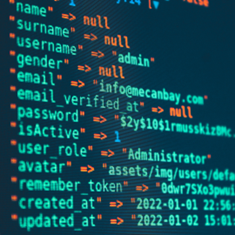Cybersecurity threats are one of the largest concerns for businesses across all industries. As technology advances, so do the methods used by cybercriminals looking to exploit vulnerabilities.
Whether it’s a hospital protecting patient records, a financial institution securing client transactions, or a nonprofit maintaining donor data, organizations must take proactive steps to ensure data protection, business continuity, and financial stability.
Industry-Specific Cybersecurity Threats
While every organization faces cyber risks, each industry has its own unique vulnerabilities and regulatory requirements. Understanding these sector-specific risks is essential for implementing effective cybersecurity measures.
Financial Institutions: Protecting Sensitive Transactions
Banks and credit unions store large amounts of sensitive financial data, making them highly attractive targets for hackers. Common threats include:
- Phishing Attacks: Cybercriminals use deceptive emails to trick employees or customers into revealing sensitive information.
- Identity Theft: Personal information, including financial information, can be stolen and used fraudulently.
- Fraudulent Transactions: Cybercriminals exploit weak security protocols to manipulate online banking systems.

Higher Education: Managing Open Networks and Data Security
Universities and colleges maintain large databases of student records, research data, and financial information. Their open-access networks make them particularly vulnerable to cyber threats such as:
- Ransomware Attacks: Hackers can lock administrators out of critical systems until a ransom is paid.
- Intellectual Property Theft: Research data and proprietary information can be stolen and sold.
- FERPA Compliance Risks: Institutions must protect student records to remain compliant with the Family Educational Rights and Privacy Act (FERPA).
Nonprofits: Cybersecurity on a Limited Budget
Nonprofits often operate with fewer IT resources and security measures, and as such, are easy targets for cyber breaches. Their most pressing risks include:
- Data Breaches: Exposure of donor records and payment information can lead to financial fraud.
- Email Scams: Phishing attacks target employees and volunteers who may not be well-trained in cybersecurity.
- Operational Disruptions: A cyberattack can halt donation processing and communications.
Small and Medium Businesses (SMBs): The Rising Threat
SMBs frequently lack dedicated cybersecurity teams, making them attractive targets for cybercriminals. The biggest threats they face include:
- Malware and Ransomware Attacks: Cybercriminals encrypt company data and demand ransom payments for its release.
- Insider Threats: Employees, whether intentionally or inadvertently, may compromise sensitive company information.
- Third-Party Vulnerabilities: SMBs often use third-party vendors whose security weaknesses can lead to breaches.
A Deeper Look: Cybersecurity Challenges in Healthcare
Among all industries, healthcare faces some of the most critical cybersecurity threats due to the sensitivity of protected health information (PHI). Cybercriminals target hospitals, clinics, and insurance providers because healthcare data holds immense value on the black market.

The Risks of Cyberattacks in Healthcare:
- Data Breaches: Exposure of PHI can lead to severe HIPAA violations and legal consequences.
- Ransomware Attacks: Cybercriminals lock access to critical medical records and demand payment.
- Operational Shutdowns: ERs and other medical services may be forced to close until systems are restored.
- Financial Losses: HIPAA fines, lawsuits, and ransom payments can be financially devastating.
- Reputation Damage: Patients lose trust in healthcare providers after a security incident.
Given the high stakes, cybersecurity is not just an IT issue—it’s a matter of patient safety. Hospitals and healthcare organizations must implement robust anti-cybersecurity breach measures, including encrypted data storage, secure backups, and incident response plans.
However, even the best security systems can be breached, making cybersecurity insurance an essential consideration.
The Role of Cybersecurity Insurance Across Industries
Cybersecurity insurance offers financial security and helps mitigate risks when a cyberattack occurs. Coverage can help businesses recover from:
- Ransomware attack response
- Data recovery and forensic investigations
- Legal fees and regulatory compliance penalties
- Customer or patient notification requirements
- Business interruption and revenue loss
As cyber breach threats continue to rise, organizations across all industries must recognize cyber insurance as a necessary investment in protecting their data, employees, and operations.

Protecting Your Organization from Cyber Threats
Regardless of industry, organizations must take a proactive approach to cybersecurity. Best practices include:
- Regular Employee Training: Phishing and social engineering attacks rely on human error, making staff training critical.
- Multi-Factor Authentication (MFA): Enhancing login security with an additional layer of protection to reduce the risk of unauthorized access.
- Data Encryption: Encrypting sensitive information makes it harder for cybercriminals to exploit stolen data.
- Frequent Security Audits: Regular system evaluations can help identify vulnerabilities before they are exploited.
- Incident Response Planning: Having a clear strategy for responding to cyberattacks minimizes downtime and financial impact.
- Cyber Insurance Coverage: Protecting your organization against financial losses resulting from cyberattacks is a crucial step in risk management.
Cybersecurity is a Business Imperative
Cyber threats are not going away—in fact, they’re evolving at an alarming rate. Every industry has its own cybersecurity challenges, but one fact remains universal: a breach can lead to devastating consequences.
Organizations should proactively protect their proprietary data, ensure compliance with industry regulations, and prepare for potential cyber incidents.
Investing in robust cybersecurity measures and cyber insurance can be what keeps a minor setback from becoming a catastrophic breach. BPJ Insurance offers customized cybersecurity coverage that provides financial protection and peace of mind. Don’t wait until an attack happens—take action now to secure your organization’s
